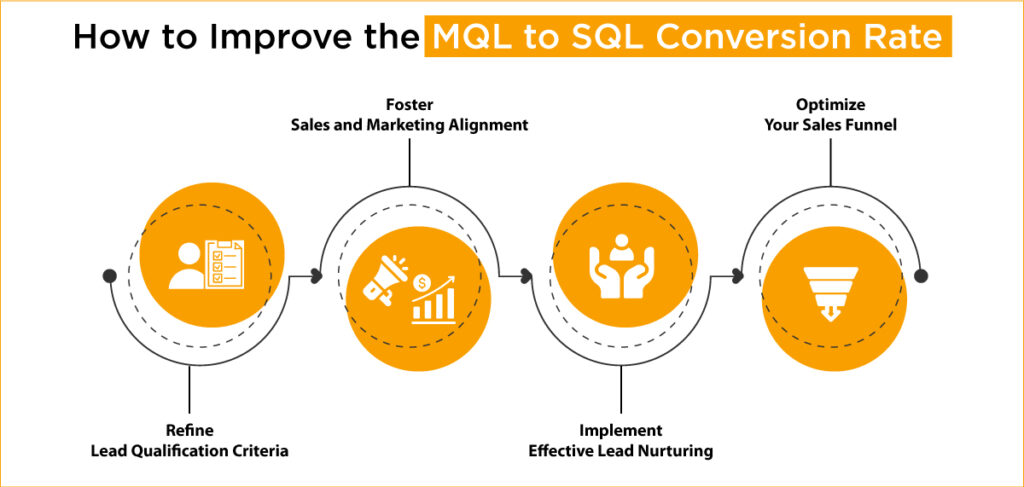
In today’s digital era, businesses are constantly striving to enhance their marketing efforts to generate more leads and drive revenue growth. Among the key metrics that have gained significant importance is the MQL to SQL Conversion Rate.
This metric evaluates the effectiveness of your lead generation and qualification process and provides crucial insights into the performance of your sales funnel. In this blog post, we will delve into the MQL to SQL conversion rate, its importance, and actionable strategies to increase it for maximizing revenue.
The Significance of MQL to SQL Conversion Rate
Table of Contents
- 1 The Significance of MQL to SQL Conversion Rate
- 1.1 What is the MQL to SQL Conversion Rate?
- 1.2 How to Calculate the MQL to SQL Conversion Rate?
- 1.3 Why is the MQL to SQL Conversion Rate Important?
- 1.4 How to Improve the MQL to SQL Conversion Rate?
- 1.5 MQL to SQL Conversion Rate Benchmark:
- 1.6 Measuring and Analyzing the MQL to SQL Conversion Rate:
- 1.7 Conclusion:
- 1.8 Share this:

What is the MQL to SQL Conversion Rate?
The MQL to SQL conversion rate measures the percentage of Marketing Qualified Leads (MQLs) that successfully transition into Sales Qualified Leads (SQLs). MQLs are prospects identified by the marketing team as having a higher likelihood of becoming customers based on their engagement with your content, website, or other marketing activities. SQLs, on the other hand, are leads deemed ready by the sales team to make a purchase or engage in sales conversations.
How to Calculate the MQL to SQL Conversion Rate?
Calculating the MQL to SQL conversion rate involves dividing the number of SQLs by the number of MQLs and multiplying the result by 100. For example, if you had 100 MQLs and 20 SQLs, the MQL to SQL conversion rate would be 20%.
Why is the MQL to SQL Conversion Rate Important?
The MQL to SQL conversion rate holds immense significance as it reflects the efficiency of your lead generation and qualification process. A high conversion rate indicates strong alignment and effective collaboration between your marketing and sales teams in moving leads through the funnel. Conversely, a low conversion rate may indicate process flaws that require attention. By analyzing trends in this metric over time, you can make data-driven decisions to optimize your sales funnel.
Must Read: How To Become An Expert At Generating MQLs!
How to Improve the MQL to SQL Conversion Rate?
There are several strategies you can employ to improve your MQL to SQL conversion rate:
1. Refine Lead Qualification Criteria:
Ensure your marketing team targets the right personas and industries to increase the likelihood of MQLs transitioning into SQLs. Read this insightful article about MQL Criteria.
2. Foster Sales and Marketing Alignment:
Promote close collaboration between your sales and marketing teams, enabling proper qualification of MQLs and prompt handover to the sales team.
3. Implement Effective Lead Nurturing:
Develop a comprehensive lead nurturing program to engage MQLs with relevant content, strengthening their connection to your brand and guiding them further down the funnel.
4. Optimize Your Sales Funnel:
Utilize data and analytics to identify potential bottlenecks in the conversion process and make targeted optimizations to improve conversion rates.
Must Read: How to Know Whether Your Lead is Qualified Enough to be a Sales Ready Lead?
MQL to SQL Conversion Rate Benchmark:
Benchmarking the MQL to SQL conversion rate varies depending on industry, business size, and target market. According to a recent HubSpot analysis, the average MQL to SQL conversion rate across all industries is approximately 13%. It’s important to note that this benchmark serves as a reference point, and your specific circumstances may result in a higher or lower conversion rate.
Measuring and Analyzing the MQL to SQL Conversion Rate:
To effectively measure and analyze your MQL to SQL conversion rate, a robust CRM system and a commitment to data accuracy are essential. This allows you to track leads throughout the entire process, identify areas for improvement, test new tactics, and optimize your sales funnel for better conversion rates.
Conclusion:
The MQL to SQL conversion rate is a crucial metric for leading B2B business, measuring marketing effectiveness and lead quality. By calculating and comparing this rate against benchmarks, you can identify areas for improvement and optimize your strategies. Targeting the right audience, personalizing messaging, aligning sales and marketing teams, and continuous measurement and analysis are key to enhancing this metric

Vikas Bhatt is the Co-Founder of ONLY B2B, a premium B2B lead generation company that specializes in helping businesses achieve their growth objectives through targeted marketing & sales campaigns. With 10+ years of experience in the industry, Vikas has a deep understanding of the challenges faced by businesses today and has developed a unique approach to lead generation that has helped clients across a range of industries around the globe. As a thought leader in the B2B marketing community, ONLY B2B specializes in demand generation, content syndication, database services and more.

.webp)
